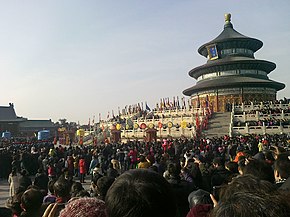
Back Shangdi BCL Шандзі BE Shangdi Catalan Shangdi Spanish شانگدی FA Shang Di French Sang-ti Hungarian Shangdi ID Shang Di Italian 天帝 Japanese

| Part of a series on |
| Chinese folk religion |
|---|
 |
Shangdi (Chinese: 上帝; pinyin: Shàngdì; Wade–Giles: Shang4 Ti4), also called simply Di (Chinese: 帝; pinyin: Dì; lit. 'God'),[1] is the name of the Chinese Highest Deity or "Lord Above" in the theology of the classical texts, especially deriving from Shang theology and finding an equivalent in the later Tiān ("Heaven" or "Great Whole") of Zhou theology.[2]
Although the use of "Tian" to refer to the absolute God of the universe is predominant in Chinese religion today, "Shangdi" continues to be used in a variety of traditions, including certain philosophical schools,[3] certain strains of Chinese Buddhism, Taoism, Confucianism,[4] some Chinese salvationist religions (notably Yiguandao) and Chinese Protestant Christianity. In addition, it is commonly used by contemporary Chinese (both mainland and overseas) and by religious and secular groups in East Asia, as a name of a singular universal deity and as a non-religious translation for God in Abrahamic religions.[5]
- ^ Cite error: The named reference
:0was invoked but never defined (see the help page). - ^ Eno (2008), p. 70.
- ^ Chang (2000).
- ^ Huang (2007), p. 457.
- ^ 《死期大公開》上帝一家難念的經 - The News Lens 關鍵評論網. The News Lens. Funscreen Weekly. 23 April 2016.
